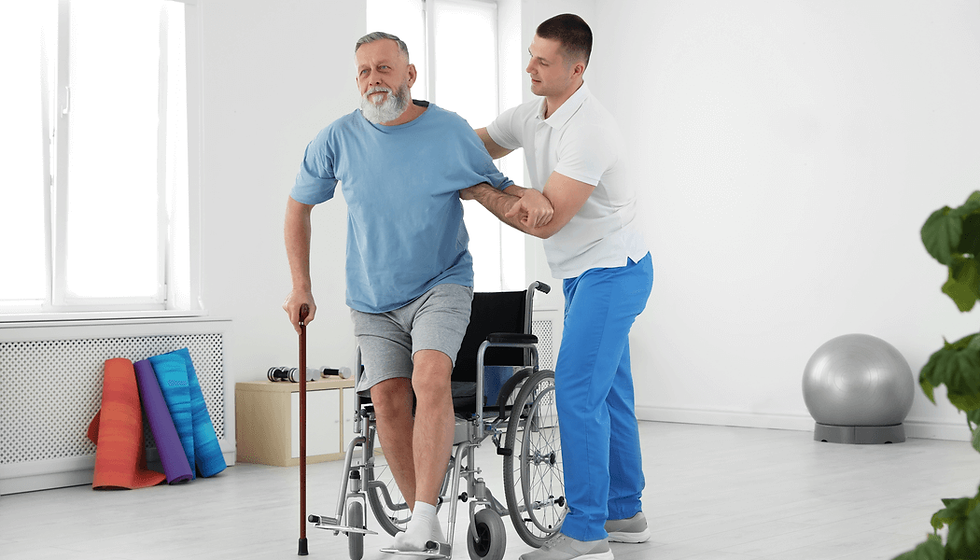Regaining Control: How Neurological Rehabilitation Helps You Reclaim Your Life
- Sven Rees

- Jul 5, 2025
- 4 min read
Updated: Jul 22, 2025

Why Neurological Rehab Matters
At Exercise Matters in Noosaville, we understand that neurological conditions can affect every aspect of daily life. Whether you're recovering from a stroke or managing Parkinson’s, Multiple Sclerosis, or Functional Neurological Disorder, our tailored neurological rehabilitation programs aim to restore movement, build independence, and improve quality of life.
Neurological rehabilitation supports recovery for individuals experiencing:
We support both NDIS participants and private clients across the Sunshine Coast.
How Exercise Helps Neurological Conditions
Neurological rehabilitation uses exercise-based treatments to improve motor control, balance, and strength. Guided by Accredited Exercise Physiologists, we create goal-based programs tailored to the client’s functional capacity.
Key benefits include:
Improved movement and coordination
Enhanced balance and fall prevention
Strength building to support independence
Reduction in fatigue and spasticity
Greater confidence in daily tasks
Supported by evidence: Task-specific training, resistance exercise, and cognitive-motor strategies are clinically proven to enhance neuroplasticity and recovery (Ada et al., 2006; Peterson et al., 2017).
Our 4-Step Neuro Rehab Process
Step 1: Assessment and Baseline Measures
We assess your strength, mobility, fatigue levels, and balance. This includes:
Functional movement screening
Muscle testing and coordination analysis
Fatigue severity scale
Step 2: Individualised Program
We design your sessions around your goals and current capacity. Sessions may include:
Resistance training
Balance retraining
Gait and mobility drills
Dual-task activities (motor + cognitive)
Cardiovascular reconditioning
Step 3: Progress Monitoring
We track improvements every 6–8 weeks, adjusting exercises as you progress.
Step 4: Education and Empowerment
You learn how to self-manage your condition through pacing strategies, fatigue management, and home exercises.
Meet Rob: Regaining Balance with Parkinson's
Rob, 68, came to Exercise Matters after his Parkinson’s diagnosis. He had balance issues, freezing episodes, and severe fatigue. Previously a keen golfer, he had stopped participating in social activities due to fear of falling. He was also experiencing low mood and increasing dependence on his partner for everyday tasks.
We developed a program that incorporated lower-limb strength training, gait training and dual-task drills to simulate real-world challenges. Sessions were conducted twice a week with tailored home-based activities in between.
After 6 months:
His walking speed improved by 25%
He was able to climb stairs unaided
His balance scores improved significantly (from 36/56 to 50/56 on the Berg Balance Scale)
Rob has since resumed weekly golf with friends and has reduced his reliance on support at home. He continues to attend maintenance sessions weekly to maintain his progress and stay independent.
The Science Behind It: Neuroplasticity
Neuroplasticity is the brain’s ability to rewire itself by forming new neural connections. This adaptive capability allows the brain to compensate for injury or disease and to adjust its activity in response to new situations or changes in the environment.
In neurological rehabilitation, our goal is to maximise neuroplasticity by delivering targeted, repetitive, and task-specific exercises that promote functional improvements.
How we harness neuroplasticity:
Repetition: Practising movements frequently enhances the brain’s recognition of the task.
Task relevance: Exercises are based on real-life movements like standing, reaching, walking, or transferring.
Cognitive engagement: Combining mental and physical challenges (dual-tasking) enhances rewiring.
Feedback: Providing feedback helps correct movement errors and reinforce correct patterns.
Supported by research: Studies demonstrate that consistent and meaningful training improves both motor and cognitive outcomes. Neuroplasticity is a key mechanism behind recovery in conditions like stroke, MS, and Parkinson’s (Kleim & Jones, 2008; Langhorne et al., 2009).
Are You a Good Candidate for Neuro Rehab?
You may benefit from neurological rehabilitation if you experience:
Difficulty walking or coordinating limbs
Muscle weakness or tremors
Problems with posture, balance, or fatigue
Challenges with daily tasks such as showering or meal prep
We commonly work with:
Adults post-stroke or with progressive conditions like Parkinson's
Children with CP or Motor Control issues
NDIS-funded clients
Elderly clients experiencing mobility loss
Getting Started
We’re located in Noosaville and serve clients across the Sunshine Coast. Getting started is easy:
Contact our team for an initial consult.
We’ll review any referrals or assessments.
You’ll receive a customised plan aligned with your goals.
Our programs may be covered under NDIS, DVA, Medicare (EPC referrals), and private health.
Contact us:
📞 (07) 5448 3532
🌐 www.exercisematters.healthcare
References:
Ada L et al. (2006). Strength training in neurological rehabilitation. Arch Phys Med Rehabil.
Peterson MD et al. (2017). Exercise in neurodegenerative disease. Current Sports Med Reports.
Kleim JA, Jones TA. (2008). Principles of experience-dependent neural plasticity. J Speech Lang Hear Res.
Langhorne P et al. (2009). Early supported discharge services for stroke patients. Cochrane Review.
Frequently Asked Questions
1. What is neurological rehabilitation?
Neurological rehabilitation is a specialised form of therapy that helps individuals recover from or manage conditions that affect the nervous system. It involves exercise therapy, balance training, strength building, and education to improve movement, function, and independence. It is particularly effective when delivered by Accredited Exercise Physiologists who individualise the plan based on the client's goals and condition severity.
2. How often should I do neuro rehab exercises?
The frequency depends on your condition, goals, and stage of recovery. Most clients benefit from 2–3 supervised sessions per week with home-based activities in between. Research suggests that consistent, repetitive training is essential for building neuroplasticity and improving outcomes (Langhorne et al., 2009).
3. Is neuro rehab covered by the NDIS?
Yes. If you have a neurological condition and an NDIS plan that includes Exercise Physiology, you may be eligible for funding under Improved Daily Living or Capacity Building. We can help you understand your eligibility and support your plan reviews with written reports and progress data.
4. What are the signs that I need neurological rehabilitation?
Signs include difficulty walking, reduced coordination, muscle weakness, tremors, fatigue, falls, or trouble with everyday tasks like dressing, cooking, or self-care. Early intervention can significantly improve long-term outcomes.



Comments